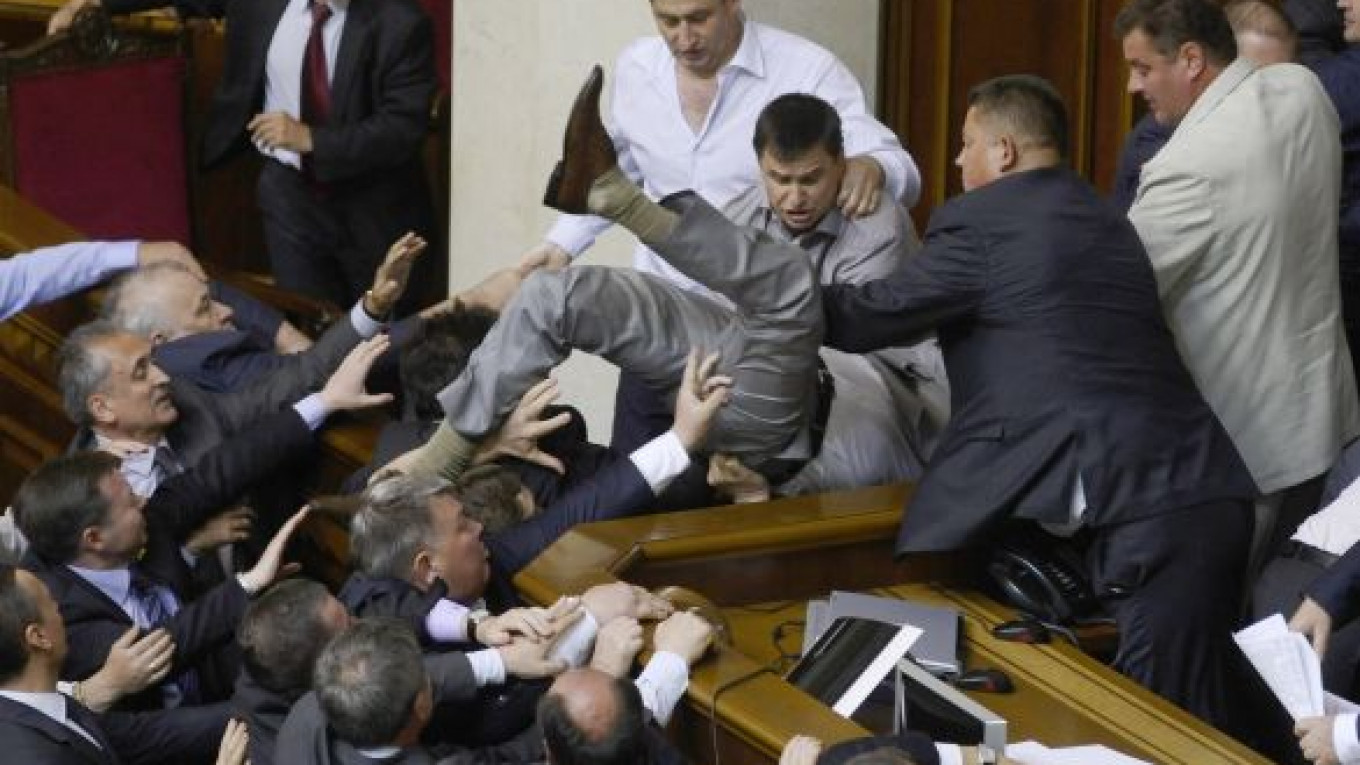KIEV — Ukraine's ruling party has triggered violent protests with a move to upgrade the official role of Russian, a sensitive issue opponents say will split the country.
A bill by President Viktor Yanukovych's Party of Regions rekindled an emotional debate.
Russian is the mother tongue of most people in the east and south, while Ukrainian, the state language, predominates in parts of the center and in the west.
Fists flew among deputies in parliament Thursday, and a crowd of about 150 people rallied Friday outside the parliament building, many of them bearing slogans in defense of Ukrainian.
"Nobody is threatening the Russian language. It is Ukrainian that has to be saved," said Yarema Goyan, a writer, who was one of those protesting. "This is no joke. Yesterday there were fights in the parliament, but tomorrow there will be fights on the streets."
Opponents of the move regard use of Ukrainian as a touchstone of sovereignty and say a growing encroachment of Russian will only keep Ukraine in Russia's sphere of influence.
The issue sets the Party of Regions, many of whose deputies have a power base in densely populated Russian-speaking industrial areas of the east, at odds with mainstream opposition parties such as that of jailed former Prime Minister Yulia Tymoshenko.
Tymoshenko's Batkivshchyna party said the bill was a cynical move by the Party of Regions to win back disenchanted voters in time for parliamentary elections in October
It warned that the bill would lead to Ukrainian being eclipsed as a language in key areas and divide the country in two.
Tymoshenko, in a statement Friday, described it as "a crime against Ukraine, the nation, its history and the people."
Party of Regions deputies said the bill reflected reality in their constituencies, where the predominant Russian speakers object to their children learning basic school subjects in Ukrainian and believe career paths are blocked by a lack of good Ukrainian.
"The Party of Regions during its election campaign declared that it would include in its program the need to solve the language problem in our state," said faction leader Oleksander Yefremov. "Our electorate is putting pressure on us."
The bill would significantly reinforce the domination of Russian in key regions such as the Donbass mining area near the border with Russia, the southeast and Crimea.
It would accord Russian the status of a "regional" language, allowing people living in Russian-speaking areas to insist that their children receive all their basic schooling in Russian.
People in those areas aspiring to, say, a career in regional administration would no longer have to demonstrate a strong command of Ukrainian, according to the bill.
Opponents say that in those areas where Russian is the main everyday language this would lead to Ukrainian eventually disappearing from use.
The bill will be welcomed in Moscow, where authorities complain that language rights of Russian speakers in Ukraine are being violated.
Russian officials have pressed Yanukovych to deliver on an election promise to recognize Russian as a state language.
During parliamentary debate Thursday, opposition lawmakers prevented Party of Regions supporters of the bill from reaching the podium.
Their actions made it impossible to vote on the measure, so Party of Regions deputies retired to consider their next move.
Yanukovych, whose mother tongue is Russian, promised to make Russian the second state language during his campaign in 2009.
But he did not press the issue after coming to power in February 2010, leaving him open to reproach by Moscow.
A Message from The Moscow Times:
Dear readers,
We are facing unprecedented challenges. Russia's Prosecutor General's Office has designated The Moscow Times as an "undesirable" organization, criminalizing our work and putting our staff at risk of prosecution. This follows our earlier unjust labeling as a "foreign agent."
These actions are direct attempts to silence independent journalism in Russia. The authorities claim our work "discredits the decisions of the Russian leadership." We see things differently: we strive to provide accurate, unbiased reporting on Russia.
We, the journalists of The Moscow Times, refuse to be silenced. But to continue our work, we need your help.
Your support, no matter how small, makes a world of difference. If you can, please support us monthly starting from just $2. It's quick to set up, and every contribution makes a significant impact.
By supporting The Moscow Times, you're defending open, independent journalism in the face of repression. Thank you for standing with us.
Remind me later.






